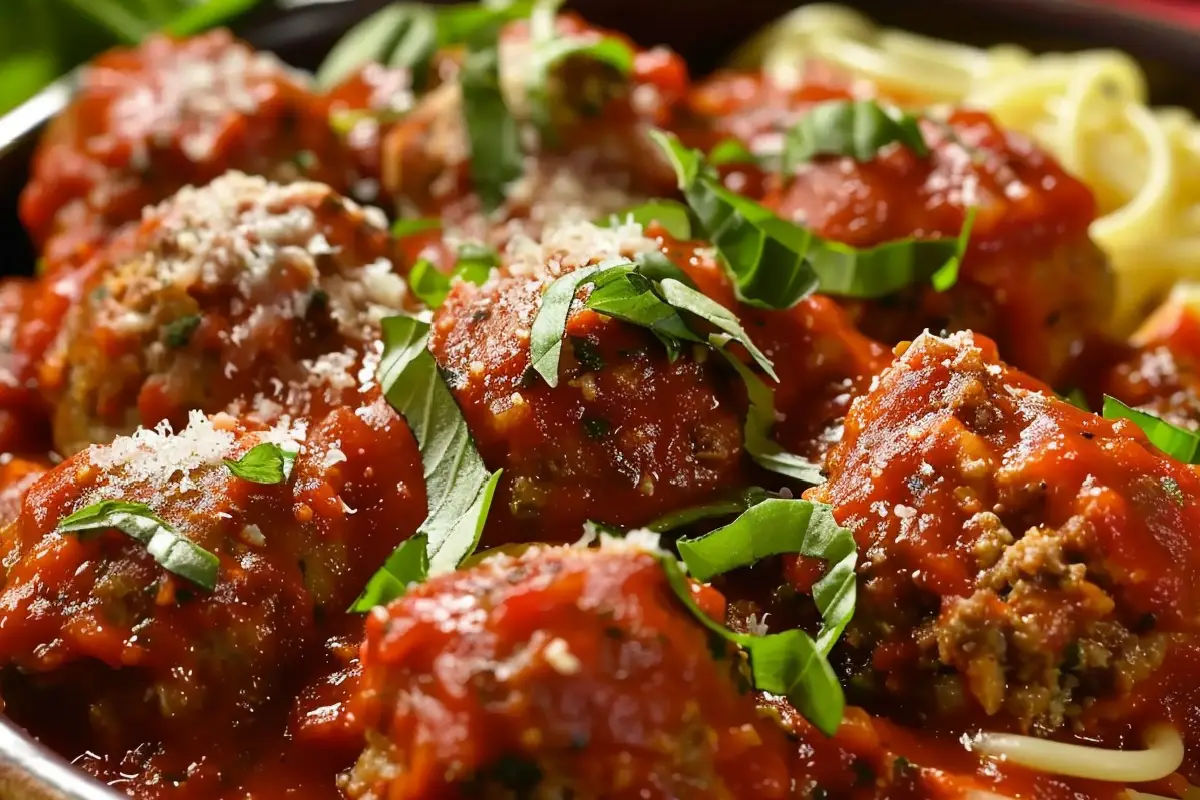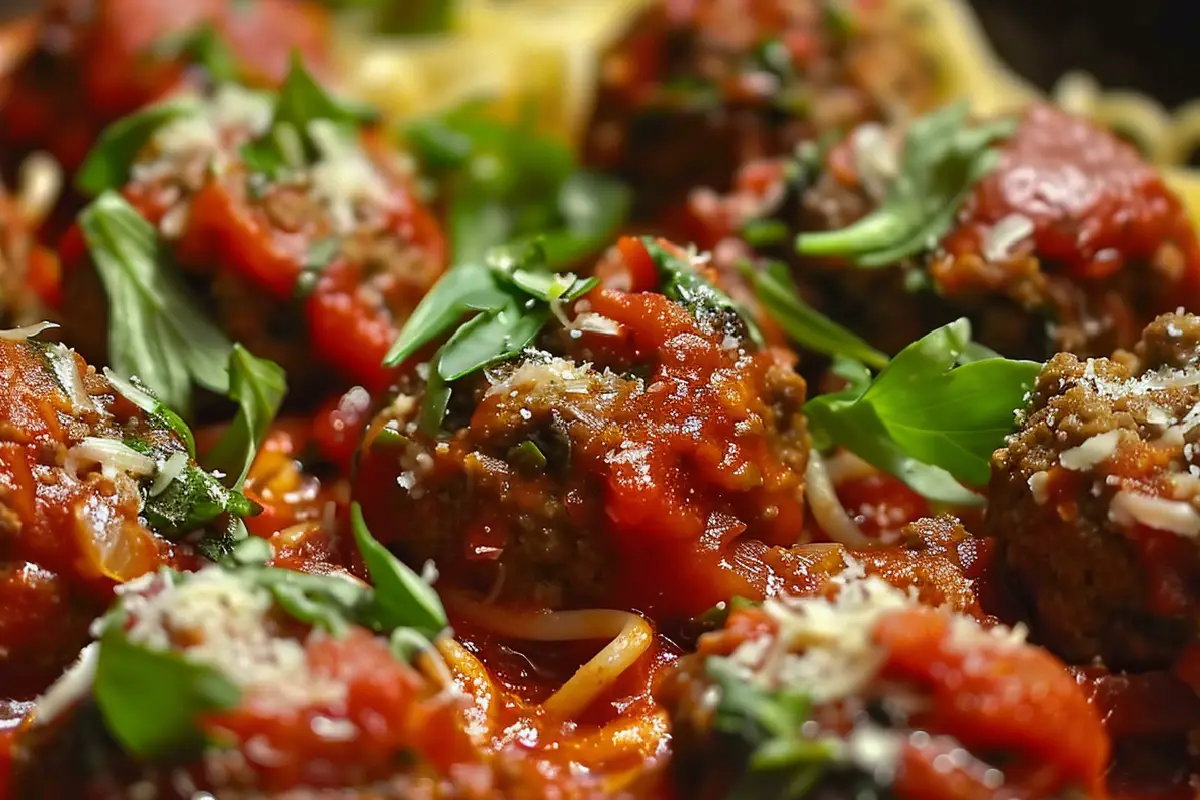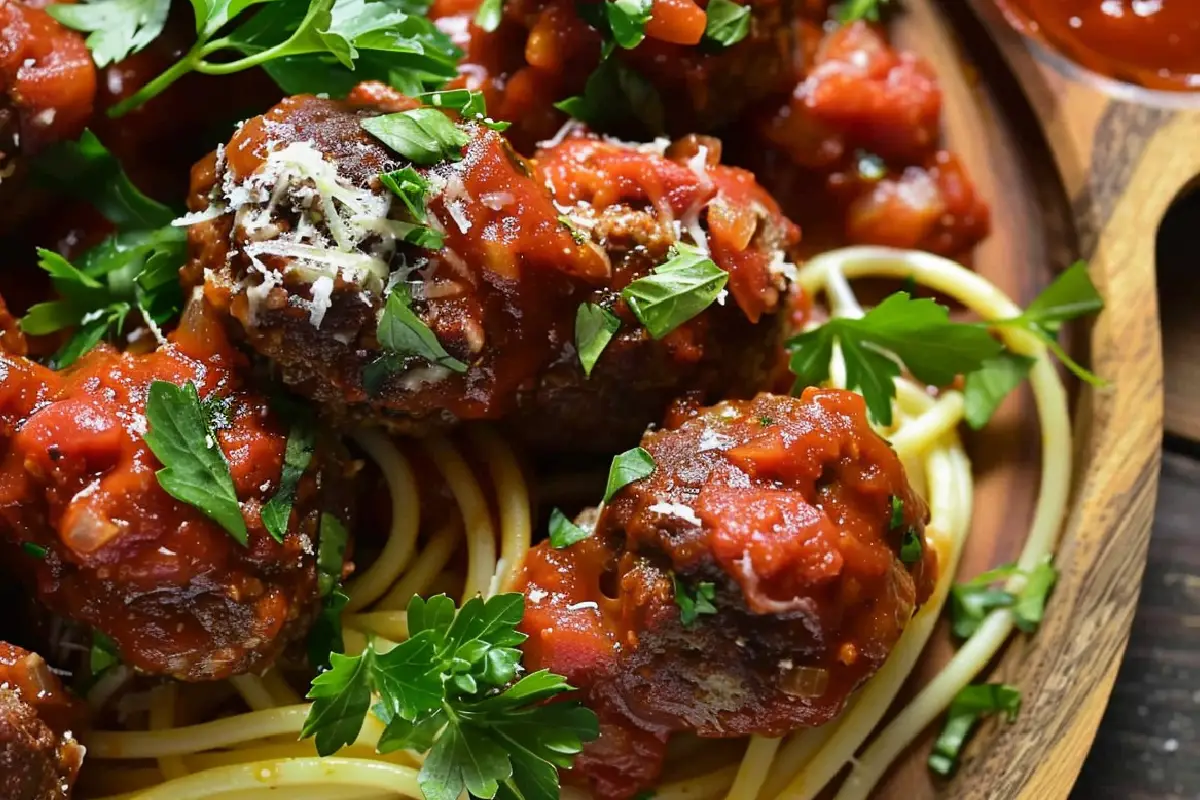Chicken meatballs can be a delicious and healthy alternative to beef or pork, but they can also turn out unexpectedly tough and dry. If you’ve found yourself wondering, why are my chicken meatballs tough, you’re not alone. In this comprehensive guide, we’ll explore the most common reasons for tough meatballs and how to fix them, so you can achieve perfectly tender and juicy meatballs every time. By the end of this article, you’ll have all the tips and techniques needed to make the best chicken meatballs, packed with flavor and moisture.
What Makes Chicken Meatballs Tough?
There are several reasons why your chicken meatballs might be tough and dry. Understanding these will help you avoid common mistakes and improve your technique.
1. Overmixing the Meat
One of the biggest culprits of tough chicken meatballs is overmixing. Ground chicken is very delicate, and when overworked, it becomes dense and rubbery. Chicken lacks the fat content of other meats, making it more prone to toughness when overmixed.
- Solution: Mix your meatball mixture just until the ingredients are combined. Using a light hand is key to preventing the development of a dense texture.
2. Using Lean Meat
Chicken breast is a popular choice for ground meat, but it’s too lean to make juicy meatballs. The lack of fat in ground chicken breast results in a dry and tough texture when cooked.
- Solution: Opt for a blend of ground chicken thigh and breast, or add some fat to your mixture, such as olive oil or grated cheese. Ground chicken thighs are higher in fat and can give your meatballs that tender, melt-in-your-mouth texture. If you can’t find ground thighs, adding a little fat (oil, butter, or even ricotta cheese) can help compensate.
3. Lack of Moisture
Chicken meatballs can easily dry out because ground chicken has less fat than pork or beef. Without moisture-rich ingredients, the meatballs will cook quickly and dry out.
- Solution: Incorporate moisture-rich ingredients into your mixture, such as milk, broth, or eggs. A popular method is to soak breadcrumbs in milk (called a panade) and then add them to the meatball mixture to retain moisture.
For a different take on moisture-rich meat dishes, you can explore how to create tender chicken by checking out Chicken Ricotta Meatballs.
4. Cooking at Too High a Temperature
Cooking your meatballs at too high a temperature can cause the exterior to cook too quickly, leaving the inside dry and tough. This is particularly common when pan-frying.
- Solution: If you’re pan-frying, use medium heat to ensure the meatballs cook evenly. Alternatively, bake them at 375°F for 15-20 minutes to ensure even cooking without drying them out.
5. Overcooking
Chicken meatballs can overcook quickly because chicken is leaner and cooks faster than beef or pork. Leaving them in the oven or pan for too long will dry them out.
- Solution: Keep an eye on your meatballs and use a meat thermometer to check for doneness. The internal temperature should reach 165°F for safe consumption, but you don’t want to cook them much longer than that.
The Role of Ingredients in Tender Meatballs

The ingredients you use will significantly impact how tender and flavorful your chicken meatballs turn out. Let’s take a closer look at the essential components of a great meatball.
1. Fat Content
Chicken breast is low in fat, which is why using only breast meat can lead to dry meatballs. Ground chicken thighs, on the other hand, have more fat and will result in a juicier texture.
- Tip: If you only have lean chicken breast, try adding 1-2 tablespoons of olive oil or butter to the mixture. You can also incorporate other fatty ingredients like grated cheese or even cream.
2. Binders
Binders like breadcrumbs and eggs are crucial for meatballs. They help hold everything together and add moisture. Without a binder, your meatballs are more likely to fall apart or become tough.
- Tip: Soaking breadcrumbs in milk (panade) is an excellent way to ensure your meatballs remain moist. For a gluten-free alternative, try using oats, almond flour, or crushed crackers.
3. Liquid Ingredients
Adding liquid ingredients to your mixture is another way to guarantee juicy meatballs. Water, broth, or even milk can make a big difference in the texture of your meatballs.
- Tip: For an extra burst of flavor, try using chicken broth or buttermilk instead of water. These liquids will enhance both the moisture and the flavor of your chicken meatballs.
If you want to learn more about keeping meat moist and flavorful, you can also try this Chicken and Broccoli Pasta Recipe.
Common Cooking Mistakes Leading to Tough Meatballs
Even with the right ingredients, improper cooking techniques can cause your meatballs to turn out tough. Here are some common mistakes to avoid:
1. Cooking at Too High a Temperature
As mentioned earlier, high heat can quickly dry out your chicken meatballs, especially when pan-frying.
- Tip: When frying, use medium heat, and turn the meatballs frequently to ensure they cook evenly. If baking, opt for a lower oven temperature (around 375°F) to keep the meatballs from drying out.
2. Overcooking
Because chicken cooks faster than other meats, overcooking is a common issue. Once the internal temperature hits 165°F, your meatballs are done.
- Tip: Use a meat thermometer to check for doneness and avoid leaving them in the oven or on the stove for too long.
3. Not Resting the Meatballs
Letting your meatballs rest after cooking helps the juices redistribute, which keeps them moist and tender.
- Tip: After cooking, allow the meatballs to rest for 5 minutes before serving. This simple step will enhance their texture and flavor.
For more tips on perfecting your meatball recipe, check out this Smoked Meatloaf Recipe, which covers similar techniques for ensuring moist, flavorful results.
Techniques for Juicy and Tender Chicken Meatballs
If your chicken meatballs often turn out tough or dry, these techniques can help you achieve better results:
1. Mix Gently
One of the most important rules when making meatballs is to avoid overmixing the meat. Overmixing leads to a tough, compact texture.
- Tip: Gently fold the ingredients together until just combined. If you’re using your hands, try dipping them in cold water to keep the mixture from sticking and prevent overworking the meat.
2. Chill the Meatballs Before Cooking
Chilling your meatball mixture before cooking helps the flavors meld and ensures the meatballs hold their shape.
- Tip: After forming your meatballs, place them on a baking sheet and refrigerate for 30 minutes before cooking. This also allows the binders (like breadcrumbs) to absorb moisture fully, contributing to a more tender texture.
3. Use a Panade
A panade is a mixture of soaked breadcrumbs that helps retain moisture and gives your meatballs a soft, tender bite.
- Tip: Soak your breadcrumbs in milk, broth, or water for 5-10 minutes before mixing them into the meat. This is especially useful if you’re using lean ground chicken.
Cooking Methods for Tender Meatballs
Different cooking methods can affect the final texture of your chicken meatballs. Here are the most popular methods, and how to use them to your advantage:
1. Baking
Baking is one of the easiest and most consistent ways to cook chicken meatballs. The oven’s even heat ensures they cook through without drying out.
- Tip: Preheat your oven to 375°F and bake the meatballs on a parchment-lined baking sheet for 15-20 minutes, or until they reach an internal temperature of 165°F.
2. Pan-Frying
Pan-frying gives the meatballs a nice, crispy exterior while keeping the inside juicy. However, it’s easy to overcook them if the heat is too high.
- Tip: Use medium heat and cook the meatballs in batches to avoid overcrowding the pan. Turn them frequently to ensure even browning.
3. Simmering in Sauce
Simmering your meatballs in sauce not only keeps them moist but also infuses them with flavor.
- Tip: Brown the meatballs first in a skillet, then transfer them to a simmering sauce (like marinara) and cook for another 15-20 minutes. This method works well for dishes like spaghetti and meatballs.
For more ideas on how to cook with sauces, check out this Smoked Meatloaf Recipe, which includes similar techniques for cooking meat in flavorful sauces.
Adjusting Recipes to Prevent Tough Meatballs
If your chicken meatballs often turn out tough, consider making the following adjustments to your recipe:
1. Increase the Fat Content
Since ground chicken is lean, adding fat to your recipe can make a huge difference in texture.
- Tip: Add 1-2 tablespoons of olive oil, butter, or grated cheese to the meat mixture. This will increase the fat content and result in more tender meatballs.
2. Add Liquid Ingredients
Incorporating water, milk, or broth into your recipe will help keep the meatballs moist.
- Tip: Add a few tablespoons of liquid to the mixture, and don’t be afraid to experiment with different flavors. For example, buttermilk can add a tangy richness, while chicken broth enhances the savory flavor.
3. Cook at a Lower Temperature
Cooking meatballs at a lower temperature can prevent them from drying out.
- Tip: If you’re baking, set the oven to 375°F instead of higher temperatures. This will allow the meatballs to cook through without drying out too quickly.
FAQs About Chicken Meatballs
Why do my chicken meatballs fall apart?
You might not be using enough binder, such as breadcrumbs or eggs, to help hold the meatballs together. Another reason could be that you’re not chilling the meatballs before cooking, which gives them time to firm up.
How can I make my chicken meatballs more flavorful?
Add herbs like parsley or cilantro, minced garlic, and onions to your meatball mixture. You can also use flavorful liquids, such as broth, in place of water to enhance the taste.
Why are my baked chicken meatballs dry?
Baked meatballs may dry out if cooked for too long or if the recipe lacks enough fat. Adding more liquid ingredients and fat to the mixture can help prevent this issue.
Expert Tips for Perfect Chicken Meatballs

Here are a few final expert tips to ensure your chicken meatballs come out perfect every time:
- Use a meat thermometer: To avoid overcooking, use a meat thermometer to check for doneness. The internal temperature should reach 165°F.
- Don’t overwork the meat: When mixing your ingredients, be gentle to avoid creating a dense, rubbery texture.
- Rest after cooking: Allowing the meatballs to rest for 5 minutes after cooking ensures that the juices redistribute, resulting in a more tender texture.
Conclusion
Making tender chicken meatballs doesn’t have to be a struggle. By understanding the common causes of tough meatballs—such as overmixing, using lean meat, and overcooking—and applying the solutions and techniques mentioned in this article, you can enjoy perfectly juicy meatballs every time. Whether you prefer them baked, pan-fried, or simmered in sauce, your chicken meatballs will turn out tender, flavorful, and satisfying. Don’t forget to experiment with different flavorings and cooking methods to suit your taste!
For more delicious chicken recipes and cooking tips, check out related articles like Chicken Casserole with Pasta and Broccoli and Smoked Meatloaf Recipe to further enhance your culinary skills!

